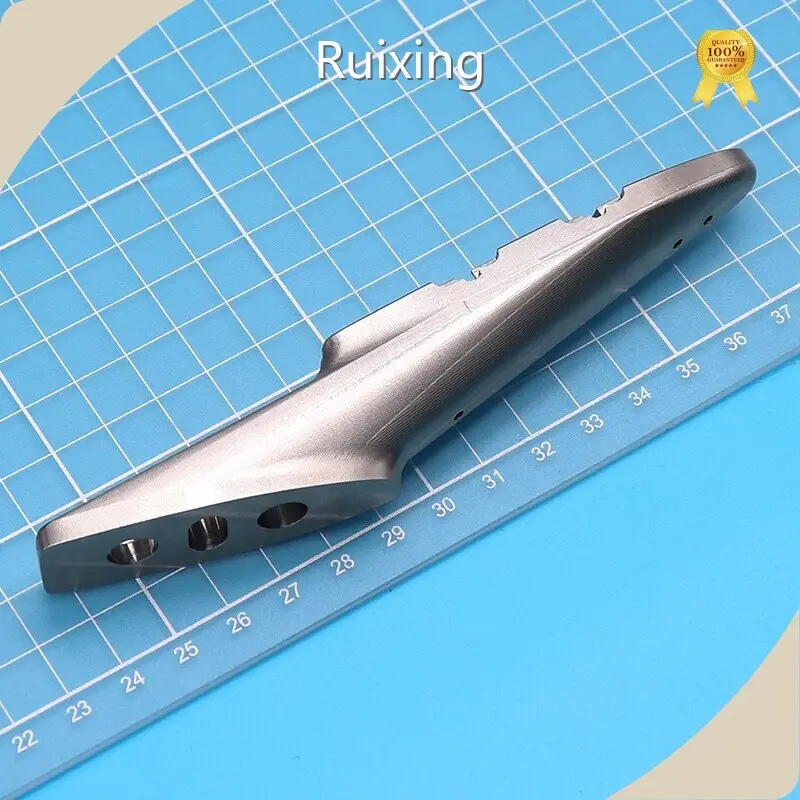Ruixing MFG - Custom CNC Machined Parts Manufacturer & Supplier For 20 Years
Titanium Component Manufacturer CNC Milling by Ruixing
Characteristic
Grade 5 Titanium (Ti-6Al-4V) is a widely used material in CNC machining due to its excellent balance of strength, lightweight properties, and corrosion resistance. Below is a detailed breakdown of its key characteristics, including numerical values, advantages, and disadvantages.
1. Chemical Composition:
- Titanium: 88.74%
- Aluminum: 6.0%
- Vanadium: 4.0%
- Oxygen: 0.2%
- Iron: 0.25%
- Carbon: 0.08%
- Nitrogen: 0.05%
- Hydrogen: 0.015%
2. Mechanical Properties:
- Tensile Strength: 950 MPa (minimum)
- Yield Strength: 880 MPa (minimum)
- Elongation: 10% (minimum)
- Modulus of Elasticity: 110 GPa
- Hardness: 35 HRC (Rockwell Hardness)
3. Density:
- 4.43 g/cm³ (approximately 60% of steel's density), making it suitable for applications where weight reduction is critical.
4. Thermal Properties:
- Melting Point: 1660°C
- Thermal Conductivity: 6.7 W/m·K
- Coefficient of Thermal Expansion: 8.6 µm/m·K
5. Corrosion Resistance:
- Grade 5 Titanium offers superior corrosion resistance in environments containing chloride ions and marine conditions due to its stable oxide layer.
Advantages:
- High Strength-to-Weight Ratio:
Grade 5 Titanium combines high strength with low density, making it an ideal choice for components where weight needs to be minimized without sacrificing mechanical performance.
- Biocompatibility:
Its biocompatible nature allows for safe use in medical implants and devices, ensuring compatibility with human tissues.
- Temperature Stability:
Withstanding temperatures up to 400°C without losing mechanical properties, Grade 5 Titanium is suitable for high-temperature applications.
- Corrosion Resistance:
The material’s resistance to various types of corrosion, including seawater and acidic environments, makes it reliable for marine and chemical processing applications.
Disadvantages:
- Machining Difficulty:
Due to its high strength and low thermal conductivity, Grade 5 Titanium is challenging to machine. Cutting tools may wear out faster, requiring precise CNC parameters and specialized tooling.
- Cost:
The production and machining of Grade 5 Titanium components are generally more expensive compared to other metals due to the complex extraction process and tooling requirements.
- Limited Use in High-Stress Applications:
Though strong, it is not always suitable for extremely high-stress applications where more robust alloys might be necessary.
Application
◎ 1. Automotive Industry
In the automotive sector, Grade 5 Titanium (Ti-6Al-4V) is favored for its high strength-to-weight ratio, corrosion resistance, and mechanical properties, making it ideal for manufacturing small, precise components. These parts are primarily used in high-performance and racing applications to enhance overall vehicle performance while reducing weight.
- Valve Components:
Titanium is used to manufacture intake and exhaust valves for high-speed engines. It withstands high temperatures while maintaining strength, reducing engine load and improving fuel efficiency.
- Connecting Rods:
In high-performance engines, titanium alloy connecting rods reduce the weight of the engine components while maintaining durability, minimizing engine vibrations, and enhancing performance.
- Exhaust System Components:
Small titanium exhaust pipes and manifolds can handle high-temperature environments, decreasing the exhaust system weight and lowering the vehicle's center of gravity.
- Turbocharger Rotors:
These compact and precise parts leverage titanium’s strength and low density to achieve rapid acceleration and high efficiency in turbocharger assemblies.
◎ Mechanical and Engineering Industry
In the mechanical and engineering fields, Grade 5 Titanium is used for high-strength, high-precision components that must remain stable in various complex environments. Titanium alloy small mechanical parts are known for their long-term reliability and performance under challenging conditions.
- Bearing Housings:
Titanium bearing housings are critical components in precision machinery, providing high stability and reducing wear over long operating periods.
- Hydraulic Valve Components:
Used in high-pressure hydraulic systems, titanium valve bodies and spools resist deformation in high-pressure environments.
- Transmission Gears and Shafts:
Small titanium alloy gears and transmission shafts can handle high-load power transmission while improving mechanical efficiency and reducing overall weight.
- Rotating Components:
Such as mechanical seals or rotary sleeves, titanium is suitable for high-speed operation, ensuring balance and precision in rotating assemblies.
◎ Medical Industry
In the medical device industry, Grade 5 Titanium is widely used due to its biocompatibility, safety, and excellent mechanical properties. It is commonly utilized for manufacturing small and precise implants and surgical instruments.
- Bone Screws and Plates:
Used in fracture fixation, these titanium components can integrate firmly with bone material, ensuring structural stability without triggering adverse biological reactions.
- Dental Implants:
Small titanium dental posts or bridges replace missing tooth roots, providing long-term stability and durability for dental restoration.
- Minimally Invasive Surgical Instruments:
Titanium-made surgical forceps, scissors, or probes are durable and corrosion-resistant, maintaining performance during lengthy surgical procedures.
- Spinal Fixation Devices:
Small titanium spinal screws and connecting rods are used to correct spinal deformities or stabilize vertebral structures during post-surgery recovery.
FAQ
Company Advantages
· Ruixing titanium component manufacturer is manufactured utilizing the finest materials and the latest production technology.
· The product is repeatedly tested to refuse any flaws.
· The firm quality awareness is also factor which contributes the high quality of titanium component manufacturer.
Company Features
· The quality of titanium component manufacturer is seldom complained by customers in Shenzhen Ruixing Precision MFG.
· Ruixing's quality has been gradually recognized by a large number of users.
· A friendly and harmonious business environment is what we are pursuing. We strive to use marketing techniques that are fair and honest and avoid any advertisement that misleads the customers.
Application of the Product
titanium component manufacturer of Ruixing can be widely used in various fields.
In the early stage, we conduct a communication survey to gain an in-depth understanding of the customer's problems. Therefore, we can develop solutions that best suit the customers based on the results of the communication survey.







